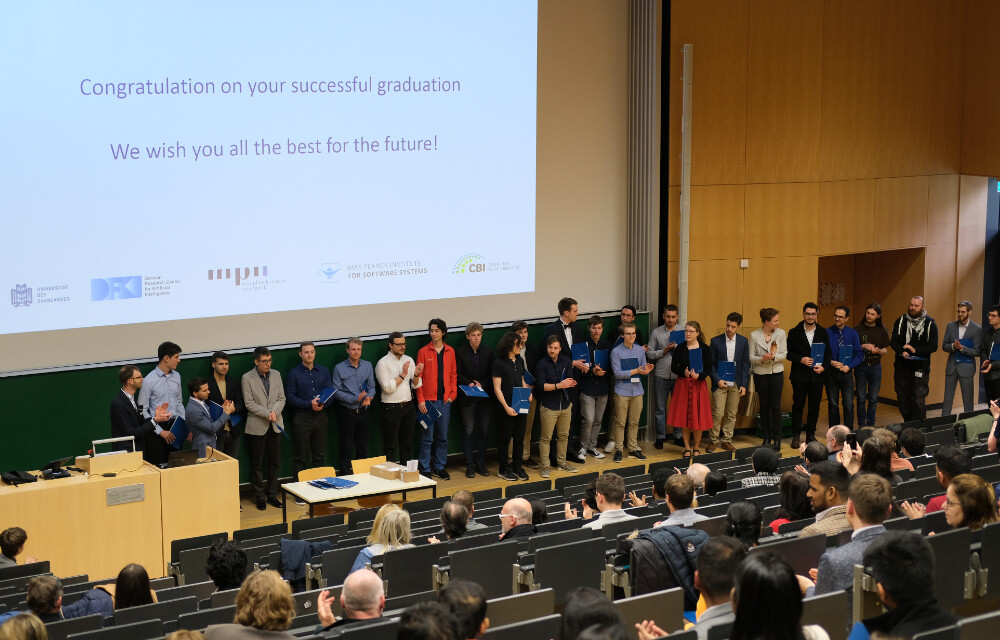Computer science graduates of Saar University celebrate their academic successes

Graduates receive their certificates at the graduation ceremony. Photo: SIC/Philipp Zapf-Schramm
For the first time since the beginning of the Corona pandemic, Saarland University’s Department of Computer Science was again able to hold a graduation ceremony. Around 200 guests, including more than 90 bachelor’s, master’s and doctoral graduates, attended the ceremony in the Günter-Hotz lecture hall on the uni campus. The highlight of the event was the awarding of the Günter-Hotz medals and the Bachelor prizes for particularly excellent degrees as well as the PhD certificates.
The Dean of the Faculty of Mathematics and Computer Science, Professor Jürgen Steimle, was very happy that the tradition of the graduation ceremony could be resumed. “Graduating is a defining moment in life and we are glad to be able to celebrate this again with the students in a fitting manner. We sincerely congratulate all our graduates, wish them all the best on their further path in life and hope that they will remain connected to their ‘alma mater’,” says Dean Jürgen Steimle.
One highlight of the graduation ceremony was the awarding of the Bachelor prizes and the Günter-Hotz medals. These are awarded to Bachelor’s and Master’s students who have distinguished themselves with particularly good final grades. The Bachelor prizes were awarded to: Lorenz Hetterich, Johannes Mathias Hostert, Mark Koch and David Wagmann. The Günter-Hotz Medals 2023 went to: Tobias Bleymehl, Jan Marc Eisenhut, Erik Colin Manasie Johnson, Peter Jose, Akhmajon Makhsadov and Jannis Rautenstrauch. The prizes were once again donated by the alumni association “Freunde der Saarbrücker Informatik e.V.”. Additionally, Jozef Hladky, Michaela Klauck, Simon Moll, Ivan Pryvalov and Ahmed Salem received their PhD certificates.
This year’s celebratory speech was given by Professor Ingmar Weber, who since September 2022 holds a Humboldt Professorship for Artificial Intelligence at Saarland University. In his talk, he introduced the still quite young research field of “Societal Computing”: This interdisciplinary research field includes, on the one hand, the computation of society, i.e. the measurement of various social phenomena (such as migration movements), especially using non-traditional data sources (such as Facebook location data). Secondly, it is about computing for society, i.e. working with partners to implement solutions that can help address societal challenges.
After the end of the official part, the participants rounded off the event at a champagne reception in the foyer of the Günter-Hotz lecture hall.
Background Saarland Informatics Campus:
900 scientists (including 400 PhD students) and about 2500 students from more than 80 nations make the Saarland Informatics Campus (SIC) one of the leading locations for computer science in Germany and Europe. Four world-renowned research institutes, namely the German Research Center for Artificial Intelligence (DFKI), the Max Planck Institute for Informatics, the Max Planck Institute for Software Systems, the Center for Bioinformatics as well as Saarland University with three departments and 24 degree programs cover the entire spectrum of computer science.
/pzs
